If you own a house with a basement, you must’ve felt the need to utilize the area more functionally and conveniently. Many homeowners are fond of the idea of turning their basements into extra rooms with various functionality.
No matter the purpose of a basement, if you use it as a living space, you’ll probably need to put a lot of thought into its ventilation and temperature control.
This article will help you consider all factors and goals while choosing the best basement air conditioner.
Comparison of the Best Basement Air Conditioners
| IMAGE | PRODUCT | |
|---|---|---|
Our Top Pick  |
| View Latest Price → |
 |
| View Latest Price → |
 |
| View Latest Price → |
 |
| View Latest Price → |
 |
| View Latest Price → |
Factors to Consider When Buying a Basement Air Conditioner
Buying an AC is a complex endeavor. Knowing about the brands and their lines isn’t enough if you want to find the best option. You need to do better homework and think about the following factors.
How Much are You Ready to Pay?
With so many options on the market, basement ACs can range anywhere from a couple of hundred dollars to thousands. Considering the budget will let you set your eye on the appliance type as well.
If you want to buy a mini-split unit, be ready to spend about $1,000, while you can buy a decent portable unit at about $500. On the other hand, extending your central air conditioning to the basement will cost the most while saving you a lot of money in the long run.

Are You Leaning Towards DIY or Professional Installation?
The budget and the AC type will also determine if you’ll need professional technicians to install the unit for you.
Portable or window units are easy to deal with, but you’re going to need professionals to install a wall unit or the central AC ducting. All of this is going to add to your budget and might change your decision.
How Big is Your Basement, and What’s the Floor Plan?
The square footage of your basement is an essential measurement for determining the AC size. You need to select a model that will cover the room and make it comfortable to be in.
Too large of a unit will freeze the room and spend more energy than necessary, while a smaller one will have a hard time cooling the room properly, leaving hot patches all around.
In addition to the area, you also need to see if your basement has blind spots, proper air flows, and insulation.
What Modes Do You Need?
While cooling is the primary function you’re seeking in an AC for your basement, there are a few other modes to look out for:
Heating
Although you might be living in a climate where you only need cooling in your basement, most units nowadays come with heating functionality as well.
Dehumidification and Air Purification
As you might already know, dehumidification is key to efficient cooling. In a basement prone to dust mites and mold, it can be essential. Best basement air conditioners include both.
Automatic Timer or Scheduling
You might not use your space all that often if you don’t have a particular set up there. Scheduled cooling sessions are highly convenient in keeping your basement at a comfortable temperature and humidity level whenever you decide to use it.
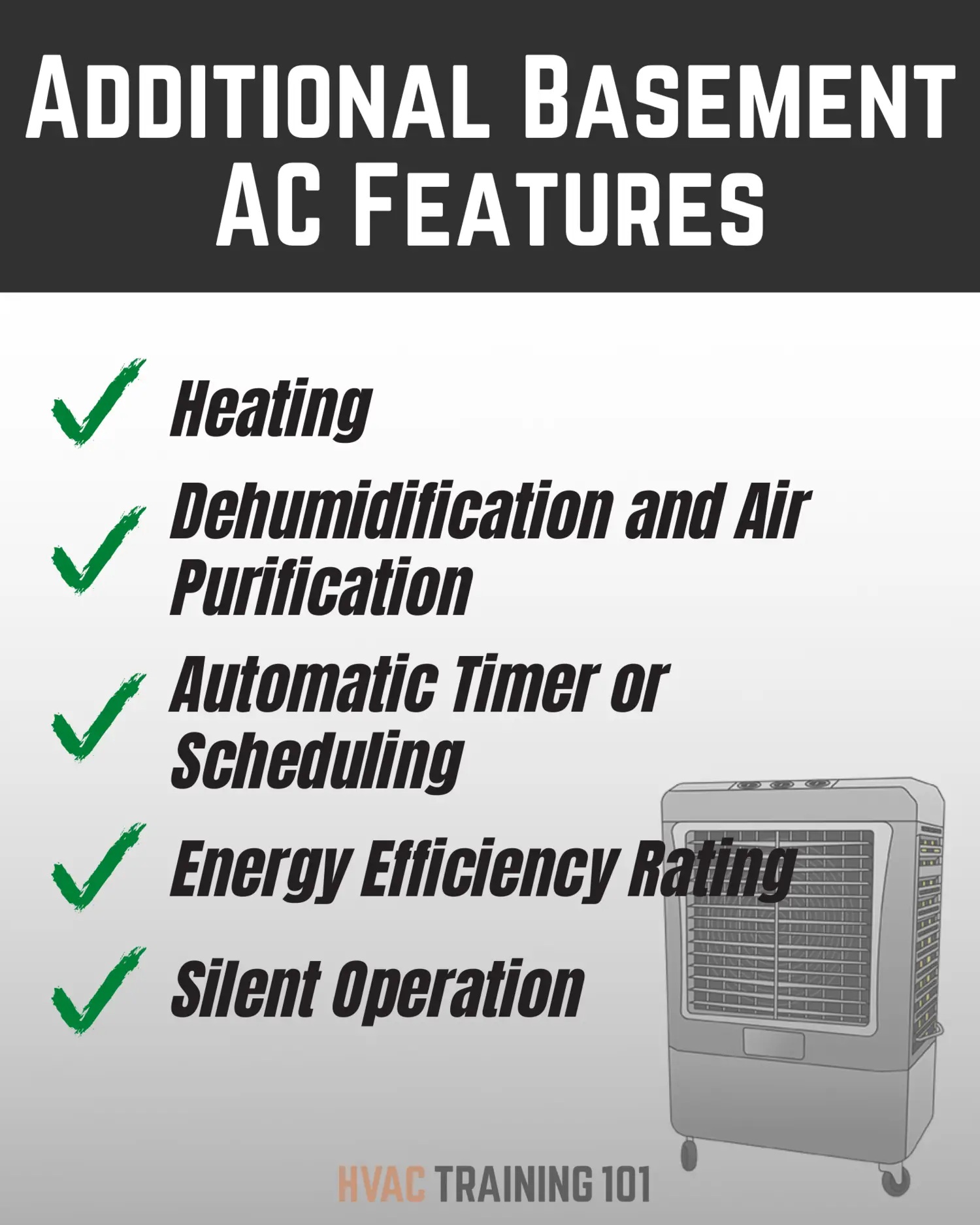
Energy Efficiency Rating
This has two sides: how much money you spend on bills every month and the broader environmental impact. Most AC manuals mention the EER in a separate column.
Silent Operation
Basements are enclosed rooms. No matter the basement functionality, it wouldn’t be nice to have a loud AC working there.
At a Glance: Our Top Picks for Basement Air Conditioners
- OUR TOP PICK: Coleman 46515811
- BEST BASEMENT WINDOW AIR CONDITIONER: Frigidaire FFRE0833S1
- BEST MINI AIR CONDITIONER FOR BASEMENT WINDOW: LG LW6017R
Review of the Best Air Conditioners For Basements
In this section, we give recommendations about the best basement air conditioners and their functionality. Read on to find the best options on the market.
Best Overall
Coleman 46515811
Specifications
BTU (DOE): N/A
Coverage Area: N/A
Airflow (CFM): N/A
Dimensions (in): 45.88×20.88×18.06
Weight: 200 lbs.
We may earn commission from purchases made from our links, at no additional cost to you
Review
If all the ducting in your house exists, this unit ensures a seamless installation and easy maintenance. It uses a two-coil compressor, which can offer “Stage 1” and “Stage 2” cooling systems for your house.
The first stage equalizes the thermostat’s demands, while Stage 2 cooling will start when the registered temperature is two degrees higher than the setpoint.
Although the manual mentions that the maintenance is effortless, it also recommends checking the air filters once a week, which might sound tedious. In reality, you only need to pay attention to the pump to ensure uninterrupted operation and dust it from time to time.
Bottom Line
The Coleman 46515811 is a whole-house solution that offers powerful heating and cooling mechanics and a reliable factory warranty.
Pros
Thermostat pairing
Minimal maintenance
Two-stage cooling system
The power of two compressors in one
Two-year product and (optional) three-year parts warranty
Cons
Weekly checkup of air filters recommended in the manual
Best Basement Window Air Conditioner
Frigidaire FFRE0833S1

Specifications
BTU (DOE): N/A
Coverage Area: 250 sq.ft.
Airflow (CFM): N/A
Dimensions (in): 18.5×15.5×13.4
Weight: 44 lbs.
We may earn commission from purchases made from our links, at no additional cost to you
Review
Most homeowners aren’t that lucky to have a window in their basement. If you’re one of those that do and want to use it at its fullest, Frigidaire 5,000 BTU window AC might be the product you’ve been searching for.
This AC is ideal for small rooms that need cooling only. It’s efficient due to the four-way air direction and dehumidification capabilities. You can easily set the desired temperature with the full-functionality remote control, plus reach out and remove the filter for recurrent cleanup.
Bottom Line
Frigidaire is a well-known brand in the air conditioner space. The critical functionality for this particular unit is dehumidification. Still, the fan speed setting allows for more precise environment control.
With its washable filter and quality build, it’ll serve you for the years to come.
Pros
Compact design
Energy star rating of 12.2 (2016)
Ideal for rooms up to 150 square feet
Dehumidification up to 1.1 pints per hour
Window width of 23-36 inches and a height of 13 inches
Cons
No heating functionality
Best Mini Air Conditioner For Basement Window
LG LW6017R
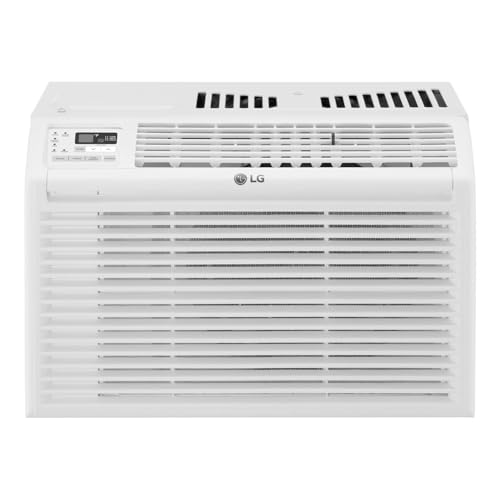
Specifications
BTU (DOE): N/A
Coverage Area: 250 sq.ft.
Airflow (CFM): N/A
Dimensions (in): 14.38×17.31×11.13
Weight: 39.6 lbs.
We may earn commission from purchases made from our links, at no additional cost to you
Review
Like the model above, this unit is built to fit into a small basement window, even smaller than the Frigidaire model, at a higher cooling capacity.
Although the product description doesn’t mention if the unit can dehumidify the room, it offers three fan speeds to refresh the air. You can also make the AC work quieter if you keep the settings on the lower side.
Scheduling the working times of the unit is easy with the built-in 24-hour timer, and if the power fails, the AC can restart at the latest setting. Maintenance is easy due to the “clean the filter” alert.
One of the glaring negatives for this unit is the absence of heating functionality if your basement gets cold during winter.
Bottom Line
LG has been building air conditioners for decades now, and while they have all the high-tech research and development, this one is a simple and affordable unit that knows what it is. If you know what to expect from it, there’s no doubt that it’s an excellent choice.
Pros
Noise levels at 52 dB
Clean alert for the filter
24-hour timer and auto restart
Three fan speeds and cooling modes
Simple full-functionality remote control
Cons
No shipping via plane, as it contains an R32 refrigerant
No information about heating and dehumidification functionality
Best Portable Air Conditioner For Basement
Batlofty Portable Air Conditioner
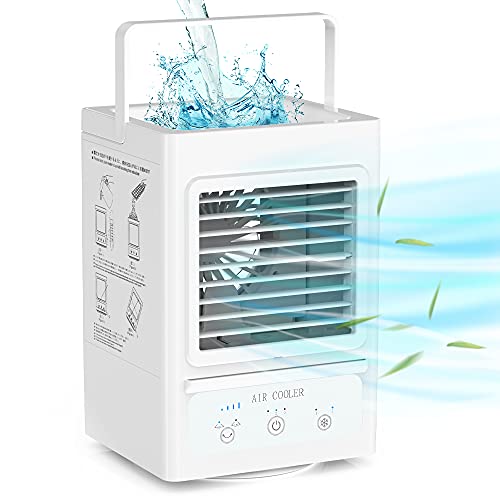
Specifications
BTU (DOE): N/A
Coverage Area: N/A
Dimensions (in): 9.8×6.6×6.2
Weight: 2.2 lbs.
Decibel Level: N/A
We may earn commission from purchases made from our links, at no additional cost to you
Review
This little personal air conditioner is a delightful innovation that makes your life so much easier and environmentally friendly. It’s a humidifier and cooler in-one that works with water (for lower temperature, add ice). You just fill in the tank, turn it on, and enjoy the fresh mist.
You can adjust the wind levels to your comfort while still having a 180-degree coverage. It’s helpful during trips outdoors and indoors for that breath of cool you might need during summer.
If you’re considering buying this device for the basement, ensure that it’s not leaving the space damp. You might also need to use a dehumidifier along with this appliance.
This small personal cooler has a few highlights to mention. First of all, it’s easy to move around, as it’s only around two pounds. Second, it’s cheap compared to traditional air conditioners. And third, it can charge using a power bank!
Bottom Line
This high-tech little beast can go on one charge for nine hours. Plus, it can recharge in three to four hours, using any power source, including your laptop, a power bank, or a car charger.
Although Batlofty can’t replace a proper air conditioner in a basement, it will serve its purpose of refreshing small areas. You just need to keep in mind that this might not be suitable for enclosed basements with high humidity issues.
Pros
Personalized cooling
Environmentally friendly operation
Humidification and cooling in one device
180-degree fan oscillation and three wind levels
Small and portable, excellent for travel and indoor cooling
Cons
No whole-room cooling
Not appropriate for damp basements
Best Small Basement Window Air Conditioner
Della 048-TL-WAC6K
Specifications
BTU (DOE):
Coverage Area: 250 sq.ft.
Airflow (CFM): 240
Dimensions (in): 15.2×15.98×12.52
Weight: 53 lbs.
We may earn commission from purchases made from our links, at no additional cost to you
Review
This window unit is a compact and lightweight choice for your basement. Its main advantage over other recommendations is the high dehumidification capacity (46 pints daily). With the controllable fan speeds, you’ll be able to ensure that the environment stays quiet too.
Unlike the LG model recommended above, the Della window air conditioner is feature-rich. It includes various modes of operation like the coveted “fan only,” allowing you to ventilate your basement efficiently.
You can also set a turn-on and off timer to keep the area cool at all times. The installation process is a breeze due to the kit included in the package.
Bottom Line
Della’s compact window air conditioner is an affordable yet efficient solution for your basement temperature and humidity issues.
It also keeps the noise levels to a minimum, making your basement a comfortable place for any activity, no matter if you’re just chilling with a videogame or sleeping.
Pros
Timer, ECO mode, and fan-only
12.1 Energy Efficiency Ratio (EER)
Dehumidification capacity 46 pints/day
Three fan speeds and noise levels from 52 to 55 dB
Ideal for enclosed spaces like server and storage rooms, basements, and trailers
Cons
Louvers regulated manually
Honeywell MN12CES

Specifications
BTU (DOE): 6,500
Coverage Area: 550 sq.ft.
Dimensions (in): 15.7×16.5×29.3
Weight: 68.3 lbs.
Decibel Level: 54 dB
We may earn commission from purchases made from our links, at no additional cost to you
Review
This Honeywell unit is an easy-to-install, sleek, and efficient portable air conditioner that makes small space thermal control a breeze. In addition to heating and cooling, this unit also has a dehumidification functionality perfect for basements.
The AC’s thermal overload protection system allows you to have peace of mind while you’re away, which is quite convenient for basements, as you probably don’t often visit the space. The 24-hour timer offers easy scheduling, precise climate, and saved dollars.
Bottom Line
This US brand is a leader in portable AC space. Honeywell products are built with the user in mind; that’s why this unit is so efficient and quiet. It offers a one-year warranty on parts and labor, plus 18 months for the compressor.
Pros
US-based brand
Three-in-one appliance
Complete digital control and timer
Compact and portable, with a sleek design
Unattended operation due to extra safety features
Cons
High operation costs
Pioneer Air Conditioner WYS009A
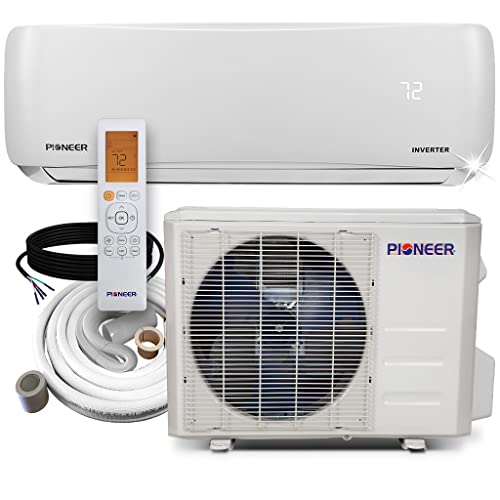
Specifications
BTU (DOE): N/A
Coverage Area: 350 sq.ft.
Airflow (CFM): 247
Dimensions (in): 28.5×7.5×11.5
Weight: 17 lbs.
We may earn commission from purchases made from our links, at no additional cost to you
Review
This unit is perfect for basements in style. First of all, its vacation mode is ideal for spaces you don’t monitor that often, and second, it blends with your wall design due to the smooth and modern front panel.
Due to its ventilation and dehumidification capability, this unit keeps the environment free from mold and improves the air quality to comfortable levels. Another highlight of this product is the silent mode of operation, a priority for a basement.
As a mini-split unit, it leaves the louder section outdoors and only brings in high air quality. You don’t even need to change filters: just wash and place them back.
Bottom Line
With this unit, Pioneer stays true to the accolades around its brand. This unit is ideal for basements for a few reasons, but its ability to control indoor air quality and temperature is the most significant.
It provides heating, cooling, ventilation, and dehumidification. The vacation mode adds to this functionality and makes this AC everything you might need in an enclosed space.
Pros
Complete installation kit
Permanent washable filters
“Inverter +” heat pump technology
Vacation mode at 46°F and a temperature range from 62 to 90°F
Small and modern design with a built-in led panel and wireless internet access
Cons
A few customer reviews mention that the louver swing function fails soon after installation
What Size Air Conditioner Do I Need for My Basement?
Specialists measure the capacity of an air conditioner in British thermal units (BTU). The higher the number, the larger space an AC can tackle. Thus, an essential factor in choosing the right AC size for your basement is its square footage.
Here is the standard formula you can use to calculate the right air conditioner size:
Necessary BTU = (Square Footage x 30 / 12,000) – 1
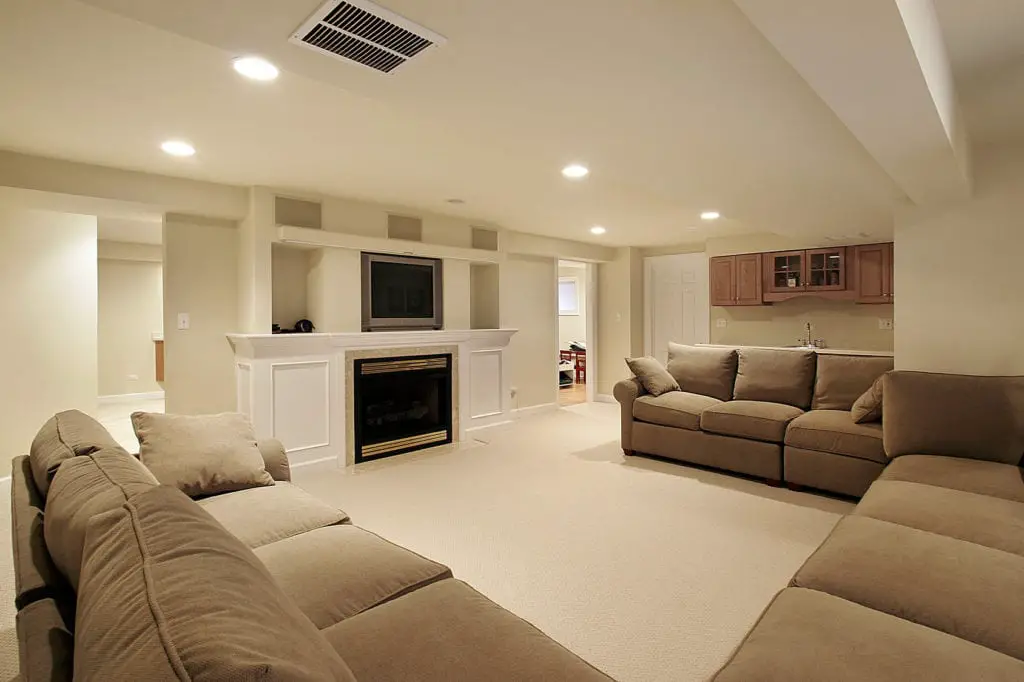
Here is a size calculator to help you out.
Another specific issue to consider is the ceiling height. This outlier is usually ignored unless it’s too high or too low. Attics and basements aren’t standard, so keeping it in mind can help.
The decision about AC sizing should also consider the humidity levels and seasonal changes in your area. Plus, think about how the basement is going to be used. Chill TV hangout space won’t need a large unit, but a gym might.
Types of Air Conditioners For Basements
Cooling a basement is an easy task if you know what to search for. Let’s go through a few appliance types and see which is better for your needs and budget.
Portable or Window AC and Dehumidifier Combo
Portable ACs are convenient for small basements. The glaring pro for this type of unit is its portability and multifunctionality. Still, it has a few considerations:
- Noise levels
- Heat production during operation
- Venting options
These are also quite affordable but in the long run, might cost you more in electricity bills than our next entry.
Ductless Mini-Split
Unlike the type above, the mini-split doesn’t take up space, is more energy-efficient, and is less noisy. While you might need to hire professionals to install the system, it’ll stay out of the way and operate seamlessly.
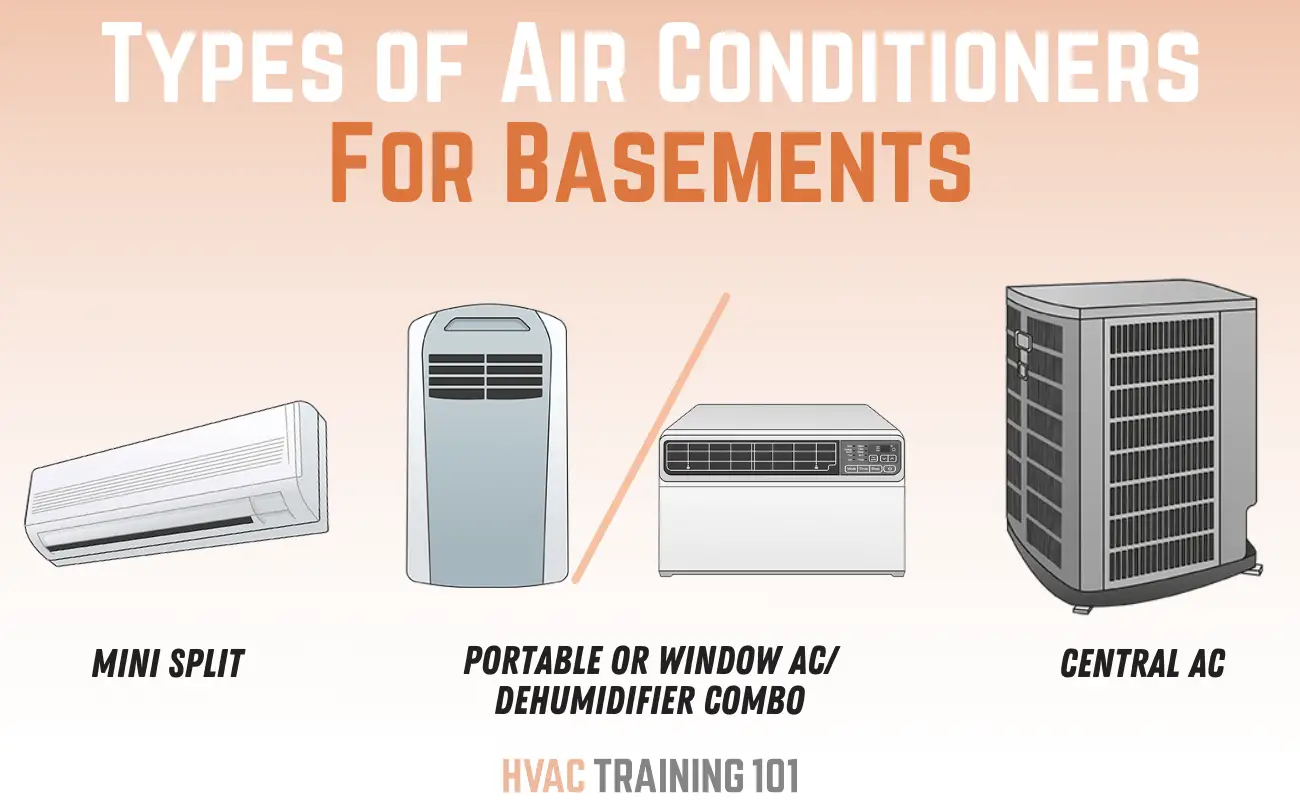
These are more expensive than portable or window units, but they save you more money in the long run.
Central AC
If you have an HVAC system installed in your home, you can add the basement to the central system.
Doing this might be a hassle at first (hiring technicians, additional ductwork, and even an extensive construction job). Still, further usage might be the most efficient and sustainable one among all options.
Basement Air Conditioner vs Dehumidifier – Which is Better?
Basements are challenging rooms in terms of air flows and quality. Depending on your climate, basement depth, and original airflow solutions, the room might be prone to high humidity levels, dust mites, and mold.
Separate dehumidifiers can be efficient if your basement is exceptionally humid. If used regularly, the best dehumidifiers can tackle the moisture without any problem. On the other hand, enclosed spaces can get hot and cold, depending on the season.
If you also need temperature control in your basement, you should consider an AC. Most modern systems offer a three-in-one functionality (heating, cooling, and dehumidification), which can be all you need for your basement.
Humid air feels hotter; that’s why if you want efficient cooling, looking at AC and dehumidifier combos is the way to go. In this case, one appliance can control all the aspects of the air quality, and you won’t have to micromanage.
Most ACs also offer ionization functionality that purifies the air and neutralizes harmful particles.
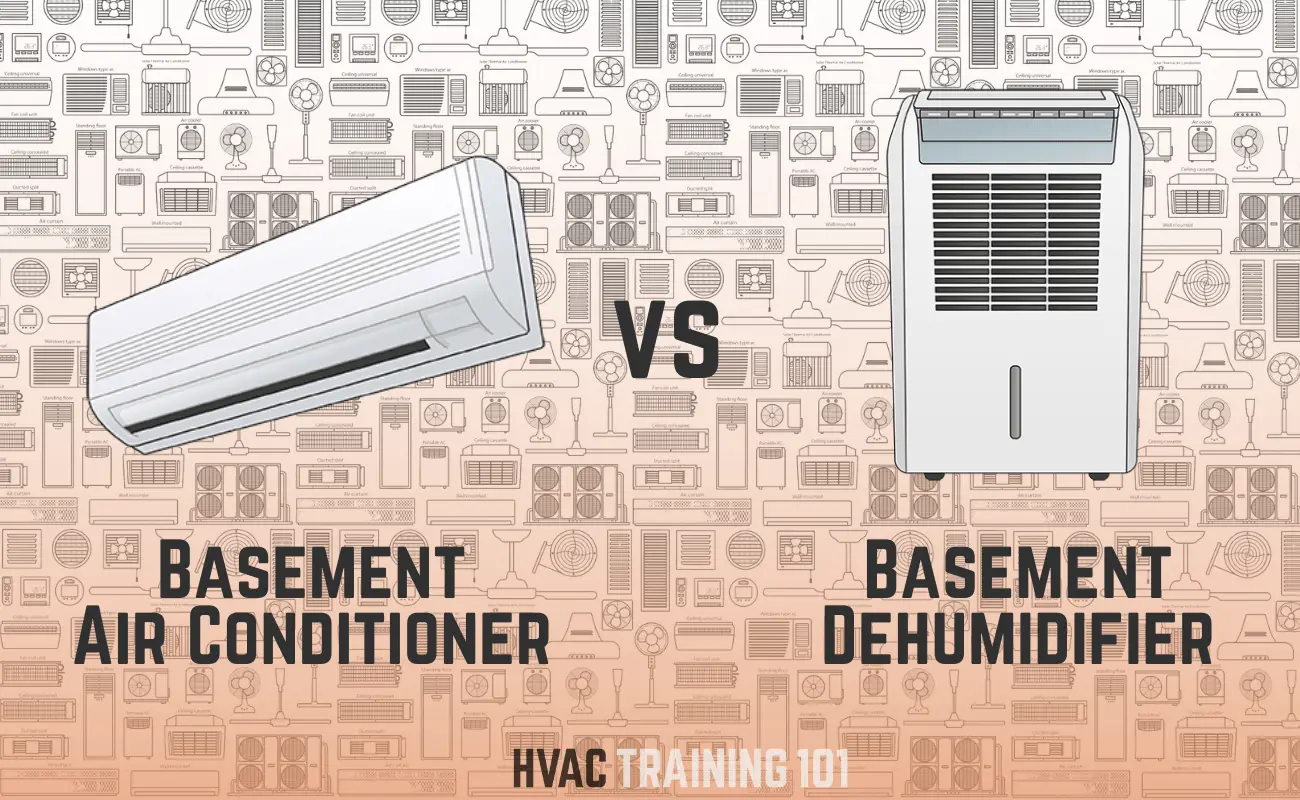
Top Brands in the Basement Air Conditioners Space
Basement air quality and temperature are pressing issues for many homeowners. Although many brands strive for excellence in this area, only those who keep all the aspects of small-area air control made our list.
Honeywell
This brand is well-known in the portable air conditioner market. With various air quality control products like humidifiers, dehumidifiers, and purifiers, Honeywell has tons of experience producing lightweight and convenient appliances.
The US-based brand also ensures fast delivery, adequate support, and a flexible return policy. Choosing one of Honeywell’s lightweight ACs will let your basement breathe like it never did before.
Frigidaire
Frigidaire has been a leader in fridge manufacturing for decades. Since 1986, it has been a daughter company for the world-acclaimed Electrolux corporation. Now, the product lines include washers and dryers, stoves and microwaves, dehumidifiers, and ACs.
The company also produces kitchenware and accessories.
This brand is a specialized choice for your basement with its separate line of dehumidifiers and air conditioners with dehumidification capability.

Price Points For Basement Air Conditioners
Air conditioners come in all shapes, sizes, and price ranges. Find the price ranges for appropriate air conditioners for basements below.
$10 – $70
These are the personal space evaporators, simple appliances that include a fan. They are so small that they can only cool a few feet. You’d put it on a tabletop in offices or right beside you during outdoor trips. These only provide a slight breeze for one or two individuals. Higher-priced models incorporate a water tank and double down as a humidifier.
$200 – $2,000
This price range is for portable, free-standing air conditioners for small spaces. The BTU rating ranges from 5,000 to 9,000 in this category. Most of the options have several modes, including dehumidification and cooling.
$140 – $2,000
Window-mounted units come in this range. The models on the lower end usually have rotary controls and manual louvers. They also offer “cooling only.” As you go up the price ladder, more modes and sophisticated options appear. They include led panels and remotes, smart timers and automatic restart options, internet connectivity, and whatnot.
$350 – $2,500
These are the wall-mounted mini-split air conditioners that include one indoor and one outdoor unit. They integrate into your design seamlessly and usually work on a low-noise level, as the noisier section is outside.
$2,500+
If you’re going for a solution for the whole house and the basement, central heating, cooling, and ventilation systems are the best. However, you can also aim for a mini-split unit with up to eight indoor sections. The capacity of higher-end models will easily cover your requirements.
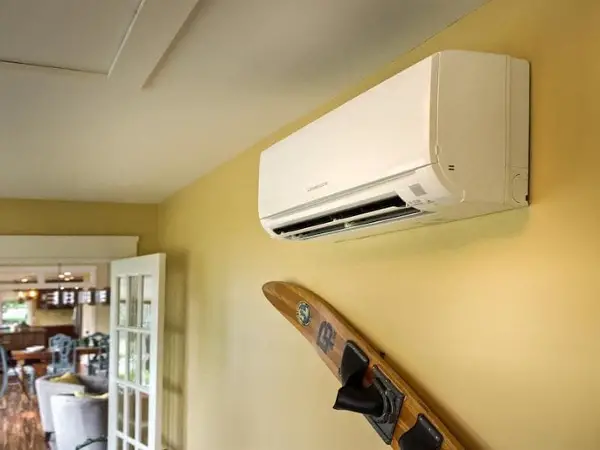
Advantages and Disadvantages of Basement Air Conditioners
Keeping basements convenient in terms of air quality without a proper appliance can be tricky to accomplish. They’re usually damp and prone to mold accumulation. Due to high humidity, they can also feel stuffy and unpleasant.
In this section, we discuss the advantages and disadvantages of basement air conditioners.
Effortless Temperature Control in the Whole House
If your basement temperature never seems right, having an appliance that can keep the air at a precise degree can influence the climate, humidity, and atmosphere maintenance in the whole house.
If you can maintain a decent temperature there, heating or cooling other rooms will be effortless.
Better Air Quality
If your basement smells of mold, the overall air quality of your house cannot be good. Plus, if you’re using the basement as a living space, you do need air quality that meets proper health standards.
No Humidity-Induced Pests
We talk a lot about fungi, mold, and mildew in basements and seem to overlook the topic of pests. A few varieties of the “not-so-pleasant” representatives of the animal world thrive in moist and stuffy conditions.
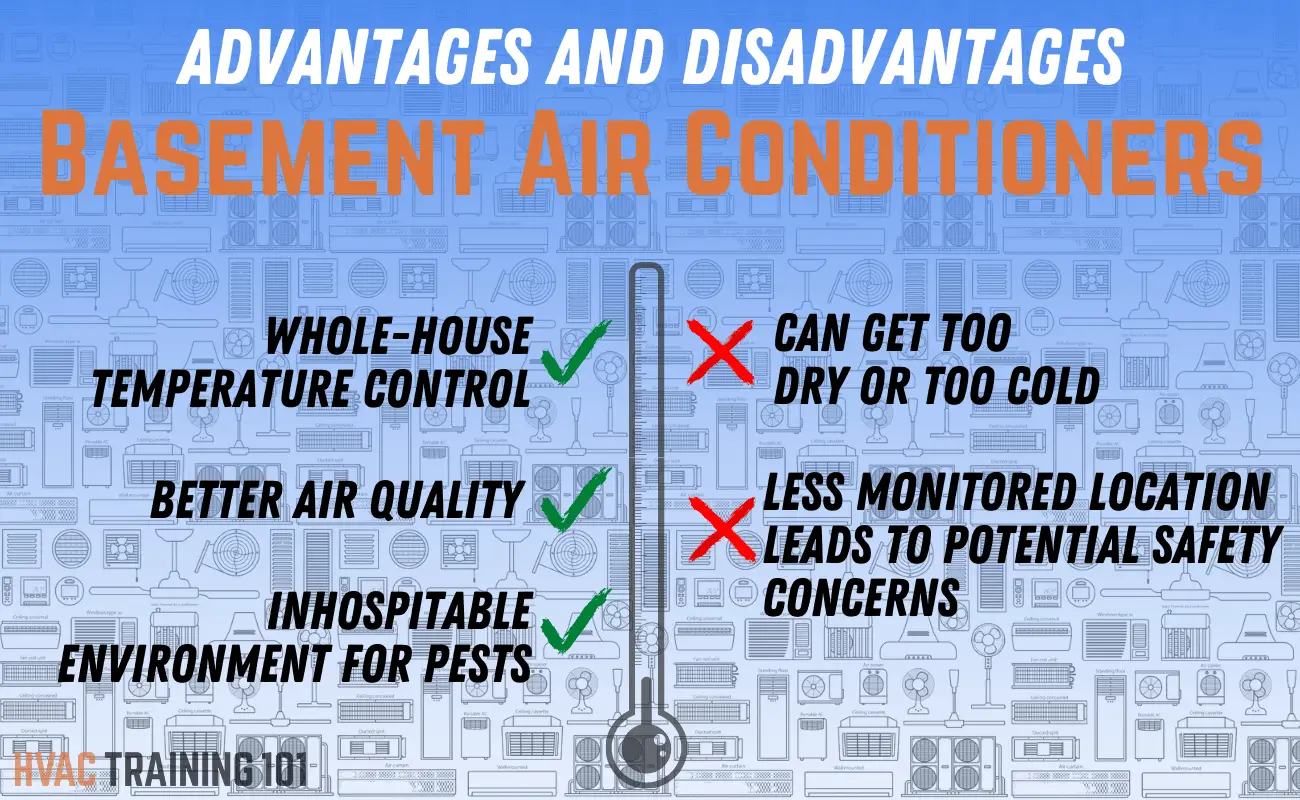
Cockroaches, centipedes, earwigs, and many other species will be less likely to bug you (pun intended!) if the basement meets the humidity and coolness standards.
It Can Get Too Dry or Too Cold
Although having a cool basement year-round is an excellent idea, especially if you’re using it as a living space, you might not pay too much attention to it unless absolutely necessary.
If you have an AC working there all the time, you’re likely to forget it’s even there. You might also get an unnecessarily large electricity bill if this happens.
Safety Concerns
While other rooms get enough attention from family members, they might not visit the basement too often. Most air conditioners these days have automatic functions that allow timed operation for steady temperatures.
Look for an AC with safety switches and restart functionality. Make sure that you don’t leave flammable objects near the electronic device. Plus, follow the manufacturer’s fire hazard policies and stay safe.
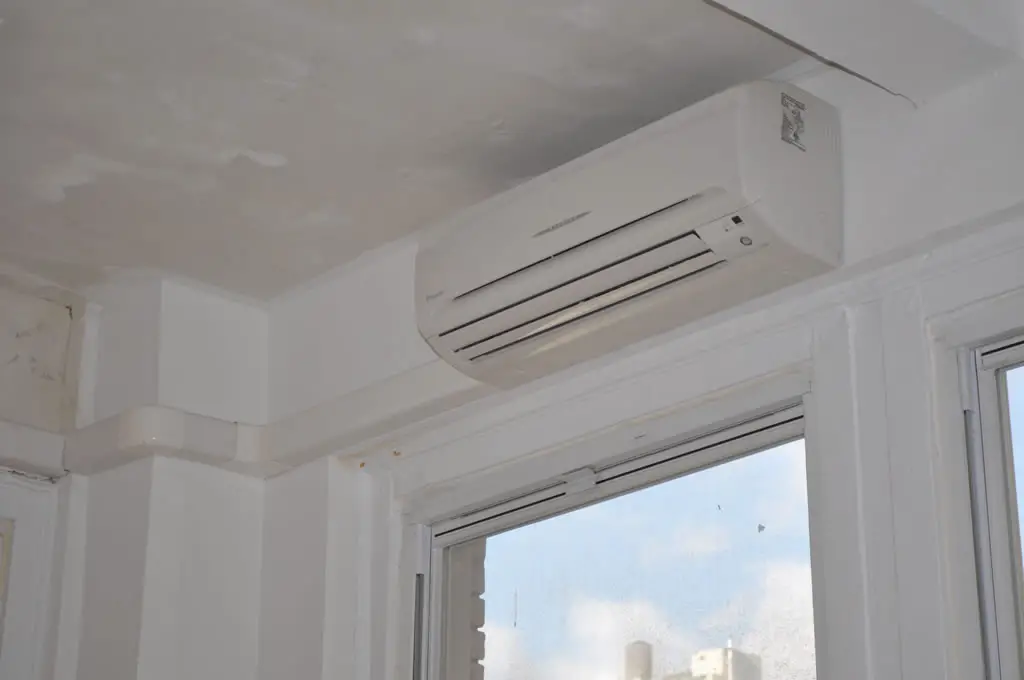
Conclusion
Proper ventilation, humidity, and temperature control are essential for basements. It’s not only a good space for fun activities but also a blank canvas for your cooling and heating needs around the house.
Follow our criteria recommendations while choosing your basement AC and use our list to find the best option.
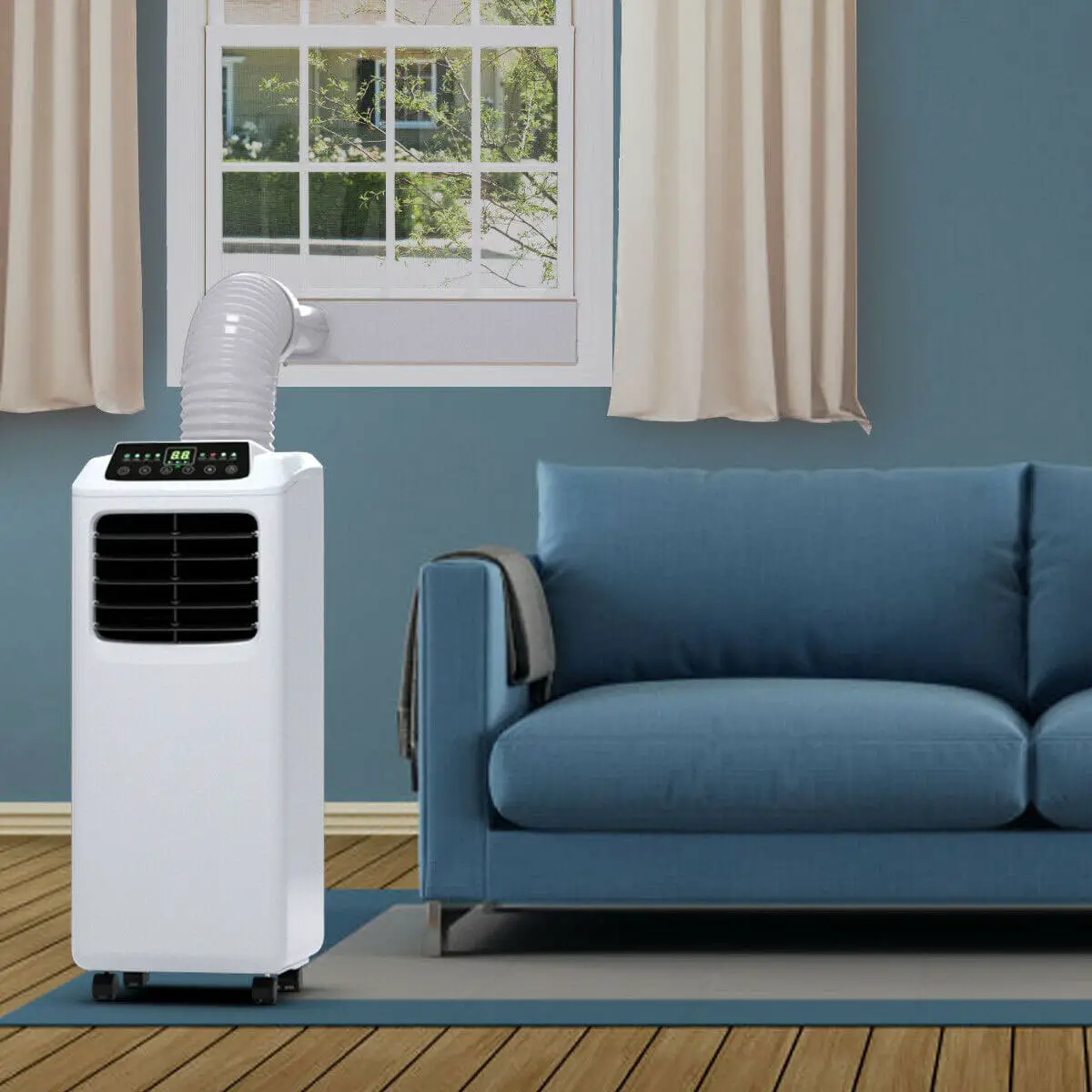
People Also Ask
The article above has touched on all the critical issues regarding the best basement air conditioners. Here are a few additional questions to help you make the right choice.
Although portable ventilation and dehumidification can be beneficial for your basement, ductless ACs are more energy-efficient, easy-to-install, and hassle-free.
Yes, you can. Best basement air conditioners not only regulate the temperature but can also control the humidity levels. They also improve overall air flows in the enclosed space.
Yes, you can, and there are a few reasons they are one of the best options. In addition to their energy efficiency, heating and cooling capacity, and dehumidification features, they leave the noisy condenser unit outside.
Plus, you don’t have to worry about venting through the window as you would for a portable unit. Just attach the indoor section to a wall and enjoy the new comfy environment.
It depends. If your whole house has a central HVAC system with heating and cooling in place, you might just need a couple of tweaks within the system to make the basement comfortable.
If you aren’t among the lucky homeowners, consider a separate unit with heating, cooling, and dehumidification for the basement.
Technically, you can use both appliances at the same time to the desired effect. However, there are very efficient air conditioning units that combine the two. Pay attention to this functionality when shopping for a basement AC.
